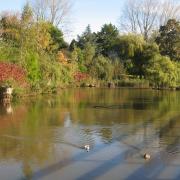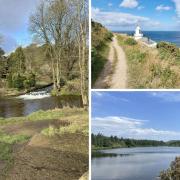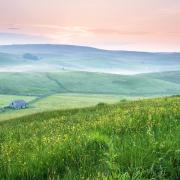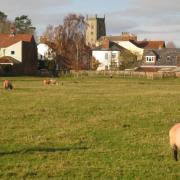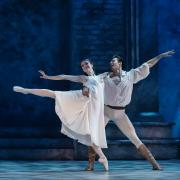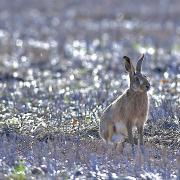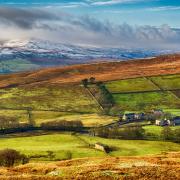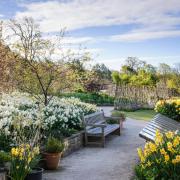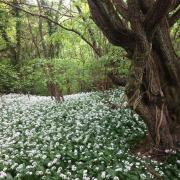A wealth of historical movie material filmed in Yorkshire is now available for free online. Tony Greenway finds out more

There’s a great film out now that you simply have to see. No, it’s not the new Mission: Impossible adventure, or The Man from UNCLE or The Fantastic Four. Those films were made for multi-gazillions in studios in Hollywood and Pinewood, whereas this one is considerably more low-key, shot entirely on location in Barnsley and had a budget of, ooh, about 5p by the looks of it. True it has the less-than-scintillating title of Birdwell Primary School May Queen 1961-1964 & School Centenary — although don’t let that put you off, because it’s fascinating.
Birdwell Primary School is not a cinematic masterpiece by any means. But it is an incredible social document for anyone remotely interested in the way we used to live before the 1960s really began to swing. It’s one of several movies made by colliery welder Ron Beardshall, the husband of the school’s then deputy head teacher, Elizabeth Beardshall and it’s now available free to watch online along with 2,500 other movies as part of a British Film Institute (BFI) project called Britain on Film, which brings together a collection of rare and never-before-seen titles from its own archive and the UK’s regional film archives (including hundreds from the Yorkshire Film Archive). ‘Birdswell Primary School is a really sweet film,’ says Robin Baker, head curator of the BFI. ‘What I love about it is that it could have been shot at my primary school back in the day. It’s a fascinating time capsule offering glimpses of behaviour that have changed since the 1960s.’
Britain on Film means that everybody now has access to film and TV titles which show places where they lived, grew up, went to school, or holidayed as a child. Through the project, the curators have found ‘extraordinary movies of ordinary people from Leeds, Bradford, Sheffield, York, Hull and beyond, including footage from the start of the 20th century,’ just 12 years after Louis Le Prince filmed the world’s first moving images in Leeds in 1888. Over the coming months, more films will be added to the collection so that, by 2017, 10,000 titles from 1895 to the present day will have been digitised and put online.
There are around one million films in the BFI archive though, and thousands upon thousands in the UK’s regional archives so selecting the ones to make available for Britain on Film wasn’t easy. ‘All the curators from across the archive looked at the material and thought: “Is it engaging? Is it interesting?”’ says Robin. ‘We weren’t looking for defining masterpieces of cinema. We wanted films that showed a location in a different way and also gave a good sense of a place at a particular moment in time.’

Highlights include footage from The Great Yorkshire Show in Bradford in 1901 and in Leeds in 1902, where men in straw boaters and bowler hats walk jerkily about with ladies in all their trussed-up frills and finery while footage from a Yorkshire student grants demo in Sheffield in 1973 is all placards, facial hair, anger and flares. Then there’s This Town of Ours (1972), made by the Halifax Cine Club (which is still running), showing the West Yorkshire mill town transitioning into the 1970s. ‘What comes across is that these are people filming their own community,’ says Robin, ‘and it’s a real labour of love.’
Where did these screen gems come from? Well, they were either public information movies shown before a main feature or toured around schools, or they were simply home movies. Others were made for TV. The Bradford Godfather (1976), for instance, is an extract from a Yorkshire Television documentary about Mohamed Fazal Hussain who, more than 40 years ago, was one of the first immigrants from Pakistan to settle in Bradford. This Town of Ours premiered in May 1972 at the Halifax Civic Theatre before being shown to audiences at the former Alexandra Hall.
One of the more bizarre finds is a 24-minute film called Davy Crockett (1955), which features a Yorkshire police officer as the raccoon-hat wearing hero from the Alamo, riding majestically through... Hull. Along the way, he stops to learn about road safety.
One of a number of road safety films made for Humberside Police by a Detective Sergeant Jacketts in the 1950s, Davy Crockett was produced to capitalise on the success of the old Fess Parker TV series. ‘Road safety was a big issue after the war,’ says Graham Relton, archive manager at the Yorkshire Film Archive. ‘The police forces usually had a film unit and they made their own road safety films which started to get more intricate and ambitious. The Davy Crocket character was huge at that time so it would have been a good idea to get a constable, put him on a horse, give him a gun and get him to trot around Hull. The film is incredibly well organised and scripted and in beautiful colour, too. I think there was an element of competition among police forces to create the most innovative and fun films.’
It’s also one of Robin Baker’s favourites. ‘Although,’ he says, ‘when Davy Crockett yanks the boy up onto his horse you do think: “Where were the health and safety people?!” They would never allow that today.’
For Graham Relton, the joy of making the films accessible is that people contact him to say they have just recognised themselves in a movie: ‘They say: “That was me in that scene, or I remember living there — and hasn’t that changed?” Or “hasn’t it stayed the same?” People also find family members through the films which is always a real pleasure; and it stimulates people to think about the films that their parents or grandparents made that might be tucked away somewhere.
‘As an archive, our remit is to find, preserve and show this content, and we’ve been doing that over a number of years. We have been at the forefront of online access to our collections and put a lot of material on the Yorkshire Screen Archive website already. But the Britain on Film project was about bringing together films with a geographical spread — and great content.’
The Great Yorkshire Show films from 1901 and 1902 are jaw-dropping, with the people in front of the camera staring right down the lens at you. All, of course, are long gone — so it’s almost eerie, like looking at ghosts. ‘Cinema had only existed for six or seven years at that point,’ says Robin Baker, ‘and a lot of those people would have been seeing a film camera for the first time. So they stare at you. I love that feeling where eyes from over a century ago penetrate your own. Actually, I think it makes them feel less like ghosts and more as if they are living now.’
You can access the Britain on Film archive at player.bfi.org.uk




